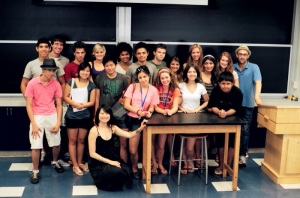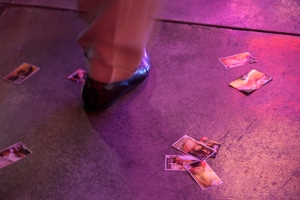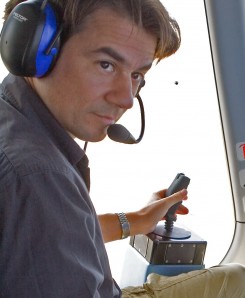“They say getting lost is easy to do. However, trying to get lost seems even harder.”
 Well, yes! Those words—written by Henrietta Steventon, a participant in the Oxbridge Academic Programs, a summer course for international high school students—were exactly the point I’ve been trying to make ever since I began writing the “Getting Lost” series for the New York Times travel section. In the last year, I’ve traveled to Tangier, Ireland, Chongqing, Las Vegas, Java, and, most recently, the Greek Islands with neither map nor guidebook, without hotel reservations or contacts, with no access to the Internet, and with no real idea of what I’m going to do when I arrive, all in the hope that I’ll get lost, either geographically (unlikely) or psychologically (possible, but tricky).
Well, yes! Those words—written by Henrietta Steventon, a participant in the Oxbridge Academic Programs, a summer course for international high school students—were exactly the point I’ve been trying to make ever since I began writing the “Getting Lost” series for the New York Times travel section. In the last year, I’ve traveled to Tangier, Ireland, Chongqing, Las Vegas, Java, and, most recently, the Greek Islands with neither map nor guidebook, without hotel reservations or contacts, with no access to the Internet, and with no real idea of what I’m going to do when I arrive, all in the hope that I’ll get lost, either geographically (unlikely) or psychologically (possible, but tricky).
Still, people keep asking why I’d want to get lost, as if it’s not simply a bad idea but a nonsensical one, a surrealist response to a perfectly normal question. Which it kind of is. Travel on its most basic level involves orienting oneself in unfamiliar places—to do the opposite of that is almost not to travel at all.
But for me, after decades of fairly intensive travel, orientation has become easy, too easy. In June of 2010, for example, I showed up in San Jose, Costa Rica, to film a video segment with a friend who’d been living there for years. Within 24 hours of arriving, I’d crisscrossed the city multiple times in a rental car, ID’d the “cool” neighborhoods, found the seedy zones, and basically understood the city’s psychogeography better than my friend. It was a feeling of accomplishment, but also of disappointment. My window of discovery lasted a single day—darn.
Now, to extend that window, I want to get lost, because it’s hard to get lost. And, in getting lost, I am opening myself up to finding new things, places and people and experiences I could never have predicted I’d find. Also, it’s pretty fun.
And so, a little over a month ago, I had the chance to explain all of this to these Oxbridge students, one of whose classes was being taught by my old friend, Wah-Ming Chang, who invited me to join in one day. For about 30 minutes, the kids—who hailed from Istanbul, Rome, Mexico City and beyond—asked me good questions, and then the fun began. Wah-Ming, her colleague Colin McDonald, and I led them all down from Barnard, where classes are held, to Central Park, and told them to get lost, or try to, with the idea that they’d be writing about their experiences afterward.
Today I have the joy of presenting you with my favorite pieces of writing to emerge from that class. First up, a little more of Ms. Steventon’s prose:
Then all of a sudden, we find ourselves surrounded by foliage. We push through. Our hearts pound with the anticipation of exploration. A single bead of sweat trickles down from my hairline. We struggle through the plant life like Moses parting the Red Sea, the wood chips crunching under our feet. We can almost feel what we have been attempting to feel for approximately 18 minutes now: that lost feeling is just reachable. We push past a trunk of a tree stretching to the sky, and are now lost in the jungles of… the fantasy has been lost. The dream destroyed. We are now standing on the side of the main road, on the border of the central park. We might as well be tourists hailing a cab. Our idea of ‘Jurassic Park’ has become the reality of Central Park.
Man, how well I know that feeling of being right on the cusp of discovery, only to watch the unfamiliar terrain coalesce into something you know all too well. But it’s instructive nonetheless, and you keep hoping that next time the discovery will be true.
As the generation of futuristic technology we often find ourselves lost in our own virtual perceptions. Lost in our own Facebook profiles while singing “Rolling in the Deep” and answering a text message. In most cases, “getting lost” in Central Park means “I’m looking at Google maps while figuring out the way.” I have a blackberry, an Itouch, and a computer; you know what I don’t have? A compass, a survival kit, and a Victorinox pocket knife. Despite the obvious details- yes, I’m a city girl. I believe that technology for all its grandeur will never surpass nature; the sun’s first bundle of light, the sound of the first leaf to descend in fall, the immensity of the ocean, and the smell of wet grass. Thus, setting off to this slightly unconventional task (has a teacher ever asked you to get lost? Exactly.) I was not surprised as to what I realized.
—Alejandrina Alvarez
While I’m pretty sure every generation since mine (or before) has defined itself as that of “futuristic technology,” Alvarez nails how our tools not only make getting lost more difficult but also get in the way of really seeing and experiencing where we are. I say this as a deep lover of Google Maps (and all maps), one who’s often walked digital paths while ignoring the gravel ones beneath my feet. Sometimes it’s necessary, but if we can survive when left to our own devices (and not the electronic kind), we’re in trouble.
One student, Hannah Silsby, took this “get lost to observe better” approach extremely far, and produced a wonderful, multiple-point-of-view narrative:
The heat sunk in past our skin as we wandered. In a state of longing for lostness, we reared left up the hill. Like a line of ants returning home, each person followed the one in front of them. The only difference was that we were not going home; we were attempting to lose our individual distinction and explore as faceless, colorless, genderless beings. We were attempting to meld with the background and observe ourselves.
The group lingered through the forest, once uninvaded by humankind, now harnessed. Searching for an unfamiliar place, barren of recognition, we funneled past peaks and curves. We stumbled upon an affectionate couple, lost in their own way.
***
Our embrace became like being one single solitary creature, daunted by an extra body. Still my legs blanketed his, my smile lingered over his. For minutes only the sun intruded on us, blazing jealously [zealously?]. A group of adventure teens wander near, seeking something besides intrusiveness. They take a perch nearby, they see us, don’t seem to mind. But we mind.
They soak themselves in the sun like black cats, wordless. A girl stands and circles the ruin of a building behind her.
***
I twist my way around the mangled birch building, peering into the windows and shaking the cracking rusted locks. Finding nothing, I circle back to the sunning stone where my classmates tan and pant. I pass a black man wearing an aging red shirt, he smiles. I wave.
***
Harry bent down towards the empty soda can hidden in the long grass and placed it in his shopping cart. The half-full cart made noises like church bells as he navigated it through the rough terrain of Central Park. His red shirt collected films of perspiration beneath the arms. He smiled at a passerby, a young blond girl.
***
Henrietta lay sprawled out on the hot stone among the other students. The dress she had recently been sent by her mother resonated in the wind, skating puffs of breath. Her eyes wandered to the couple only a few feet away: once so affectionate, now cautious. She thought it sad, that the gay couple had changed their positions so drastically from affectionate to friendship. Would they have kept their holds of each other if they had been a straight couple? She prayed that they were only shy expressing affection, and not with their identities.
Henrietta followed the school of students exiting the scene, her vibrant pink dress still respirating in competition with the wind.
***
Once we returned to the meeting place, we planted our supple, sweating bodies on the benches. Just beyond the boundaries of the railing sat an open valley of heaving hills. A pair of sparrows chased each other, tail to beak, about the pathway before taking leisure on the railings behind a bench. I observed them. They flirted and bobbed together, stealing my attention. I removed my notebook from my bag and attempted to sketch the moving companions. They flittered lovingly between excited rotations and gentle smooches. They were bothered not by the wind nor by my peering eye or flickering pen, and were distracted only by each other’s actions.
The slow exhale of the wind leapt about my forearms and giving life to a newspaper sheet rolling by. The birds took no notice of the sighing earth, and simply continued flirting.
Of all the students, the fedora-wearing flâneur Felipe de la Hoz—who I came to think of as Mr. Hat—perhaps got the “getting lost” point the best:
I believe getting lost is a beautiful thing. There are really very few experiences as freeing as finding yourself in unknown territory. We are so used to knowing exactly where we are and where we are going at every moment of the day that once we actually look around and are struck suddenly by the cold splash of reality, by the realization that we are, surprisingly, not in control and indeed completely helpless, it immediately turns off all of that static in your mind, all the white noise, the chores, the petty problems are wiped, the hard drive rebooted and you are left floored. Everything else is gone, and now there is only you and this place, this alien place, wonderful and terrifying, removed from everything and everyone; and you are left in nirvana. Time stretches out, it becomes irrelevant and distant; seconds blend into minutes and hours. There is no purpose. There is no destination. Walking goes from being a method of transportation to an almost meditative state; it is a trance, as deeply introspective as any religious service. It is the experience of exploration that we all had yet have forgotten about with the passing of years; it is the same exploration as that of a child, a child bewildered by the fresh and new world around him, experiencing all the sights and sensations individually, each tree on each leaf fascinating, hungrily studied and absorbed and loved and appreciated. There is no why; why is not necessary in this place. Getting lost is like spending day after day after day living in generic stock photographs, and then, one day, tripping into an impressionist painting. All the things you didn’t notice could be there if you simply look at the world a different way. Every element of the landscape is now a finely crafted work of art. Who knew the branches were such a sight? Who knew buildings were not just places you went to pay your bills, but each has a life and a personality to be observed? The warped lens has been removed, and you can see things as they are. Don’t ignore the world; the world is here for you to see and experience and appreciate. The next time you look around and what you see is not what you expected, consider yourself lucky; each sight and person and experience is a gift, and it is up to you to find it.
Finally, I’d be remiss in not quoting Julia Fonteles, who didn’t quite get lost but who did get right to the heart of the weirdness of travel writing:
It was an interesting idea, and it’s hard to imagine someone making money out of this job which is really an adventure. I guess people make money doing all kinds of things today.
Well, yes!





